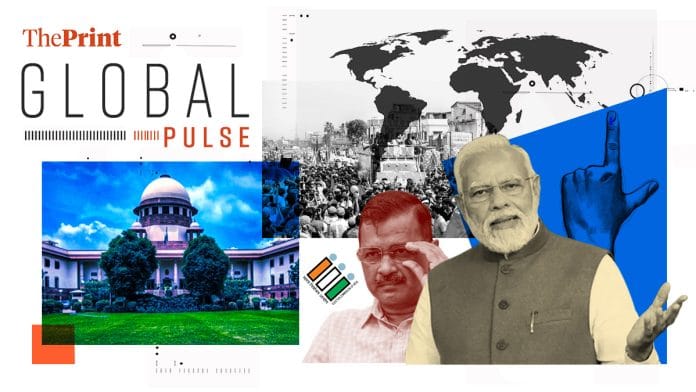New Delhi: The Prime Minister’s speeches at three election rallies in Rajasthan and Uttar Pradesh “mark a shift in Modi’s tone”, reports Bloomberg, taking cognisance of the political row the speeches sparked.
The report—’Modi steps up attacks on opposition welfare plan as India votes’—quoted the PM as saying, “Indian National Congress would redistribute property and wealth and give it to minorities.”
The report also quotes other BJP members who “fanned the tension”. Yogi Adityanath, the report says, “claimed the Congress party would implement Sharia — or Islamic religious — law if voted into power”, while BJP national spokesman Gaurav Bhatia “said earlier this week that Modi was echoing the sentiments of every citizen”.
Nikkei Asia too reported on the PM’s speeches, with reactions from citizens such as “wasn’t surprised by Modi’s language”. Its report—’India’s Modi under fire for election ‘hate speech’ against Muslims’—observed that critics have noted that Modi’s “campaign-trail comments” have triggered “anger and fear among the minority group”.
The Japanese media organisation also carried an editorial in which it called India the “undisputed leader among the developing countries”. The editorial—’Democracy put to the test in India’s general election’—notes BJP “appears to be leading the election”, adding that the GDP expansion forecast by the World Bank “will provide a tail wind for the ruling party”. But, it says Modi’s tenure “has been marked by his heavy-handed rule”, including the revised citizenship law and the arrest of Arvind Kejriwal, whom the piece credits as the “spearhead of the anti-Modi movement”.
An analysis in Foreign Policy by columnist Sumit Ganguly, a visiting fellow at the Hoover Institution at Stanford University, tries to map the role of the Indian Supreme Court in recent years and alleges that it has been “siding with the BJP”.
Judgments “based on questionable legal premises”—namely in the Ram Mandir case—and the upholding of the repeal of Article 370 “have bolstered the BJP’s nationalist project”, says the author. Even the denial of the petition to permit same-sex marriage in India, Ganguly writes, “played into the hands of the BJP, strengthening its stance on what it deems to be traditional Hindu values under assault from liberal notions of modernity”.
The piece—’India’s Courts Must Keep Their Autonomy’—also notes the recent appointments of former Chief Justice of India Ranjan Gogoi to the Rajya Sabha and former SC Justice S. Abdul Nazeer as governor of Andhra Pradesh, which, it adds, have led to the SC losing “some of its sheen”.
The verdict striking down the electoral bonds scheme “showed that the Indian Supreme Court still retains some independence” and is still “momentous, even as it leaves legal experts guessing about the court’s motivations”, Ganguly writes.
He questions if the return of the BJP to power for a third term will lead to the SC “checking the possible arbitrary use of power” as upcoming matters, involving the Gyanvapi mosque in Varanasi, the powers of the Enforcement Directorate, a key financial crimes investigative agency, and the religious freedom of women, will “bear watching”.
Al Jazeera’s T.A. Ameerudheen brings to light the role of the Indian diaspora based in the Gulf in the Indian elections. The author writes about an election rally by a Congress leader in Sharjah. Shafi Parambil “launched into a blistering attack on Prime Minister Narendra Modi and Kerala state Chief Minister Pinarayi Vijayan”, says Ameerudheen. The reason, Ameerudheen adds, is the distinct behaviour of the Gulf expatriates, who are mostly from Kerala and “fly back to India to cast their ballots”.
The report—’Indian Gulf workers: The unlikely voters parties are wooing for elections’—says the Kerala Muslim Cultural Centre (KMCC), an organisation “affiliated with the Indian Union Muslim League, a prominent political party in Kerala that is allied with the Congress”, plans to “fly back at least 10,000 of its members to Kerala by Friday”. With units in Qatar, Oman, Bahrain, Saudi Arabia, and Kuwait, KMCC offers either “free tickets” or “discounted” ones to NRIs.
A Washington Post report—’AI deepfakes threaten to upend global elections. No one can stop them’—notes the use of AI in Indian election campaigns. It says “The Indian Deepfaker” Divyendra Singh Jadoun, “famous for using artificial intelligence to create Bollywood sequences and TV commercials”, is reported to have had “hundreds of politicians” “clamouring for his services, with more than half asking for ‘unethical’ things”. The “explosion of AI tools is transforming the democratic process, making it easy to develop seamless fake media around campaigns”, says the report, while observing a “global uptick” in deep fakes.
China-US ties & South Korea’s birth rate problem
US Secretary of State Antony Blinken is on a three-day trip in China’s Beijing to discuss Russia, Taiwan, and trade. To know more, read Al Jazeera’s report.
Amid a declining birth rate, South Korea may start paying parents in cash for the birth of a child and is holding a survey to gauge public opinion on the same. Read The Independent’s report to know more.
(Edited by Madhurita Goswami)
Also read: US is rolling out the red carpet for Modi. But White House knows Indian PM is his own man






